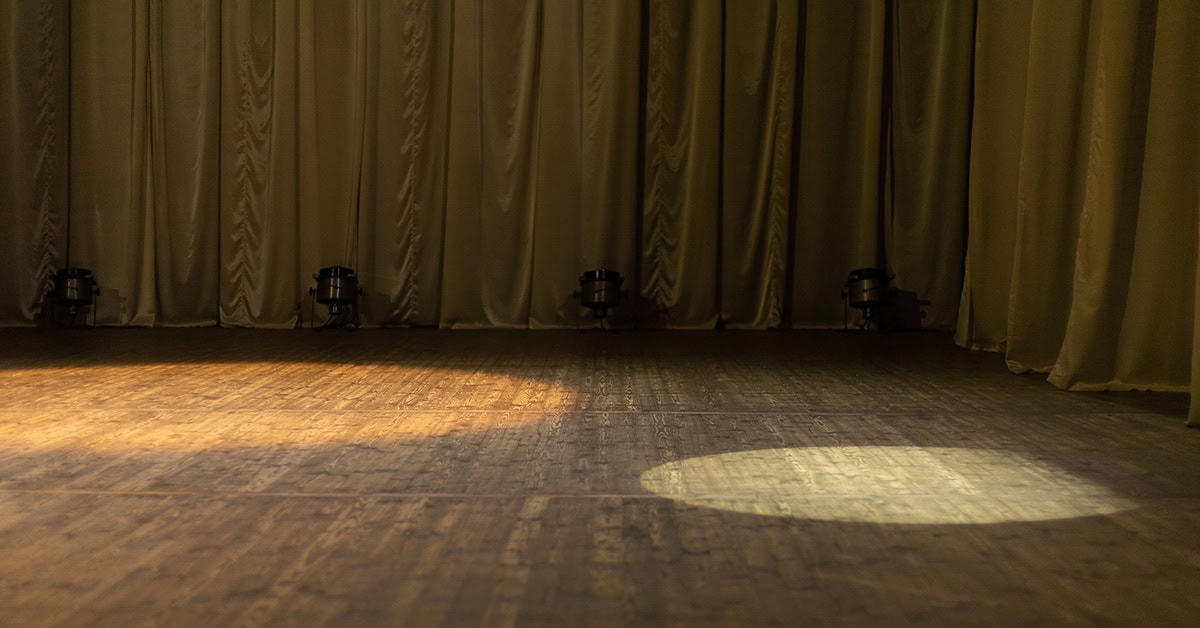
“Fascinating Rhythm”
This song, with music composed by George Gershwin, was penned for the 1924 musical Lady, Be Good! (US/UK) and first performed and recorded by Fred Astaire. “Fascinating Rhythm” marks the first of many fantastic collaborations between brothers George and Ira Gershwin. Ira’s lyrics scan perfectly with George’s complex, syncopated melody and feature some colorful period slang, including “flivver,” a term for a dilapidated car or aircraft.
Fascinating Rhythm,
You’ve got me on the go!
Fascinating Rhythm,
I’m all aquiver.
What a mess you’re making!
The neighbors want to know
Why I’m always shaking
Just like a flivver.
The song also appears in the Gershwin musical Nice Work if You Can Get It (US/UK).
“Someone to Watch Over Me”
Composed in 1926 in partnership with George, this song was originally created as a “fast and jazzy” uptempo standard for the musical Oh, Kay! (US/UK) but a number of slower interpretations of the song led to the ballad version becoming the standard. The song was recorded by Frank Sinatra for his debut album, The Voice of Frank Sinatra. Ira’s lyrics here are simple and guileless — there’s one “clever” rhyme (“man some / handsome”) and the rest is pure honesty.
There’s a somebody I’m longing to see.
I hope that he
Turns out to be
Someone who’ll watch over me.
Although he may not be the man some
Girls think of as handsome,
To my heart he carries the key.
The song also appears in the musical Crazy for You (US/UK).
“’S Wonderful”
Created with George in 1927 for the musical Oh, Kay! (US/UK), this sophisticated charm song later appeared in the film version of An American in Paris, sung by Gene Kelly and Georges Guétary. In the 1957 film version of Funny Face, the song would be performed by Audrey Hepburn and Fred Astaire. Ira’s lyrics here are rife with short phrases and upper-crust wordplay, a la Cole Porter.
’S Wonderful,
’S marvelous
You should care for me.
’S awfully nice,
’S paradise,
’S what I love to see!
The song appears in several Gershwin musicals, including An American in Paris (US/UK), Nice Work if You Can Get It (US/UK), and My One and Only (US/UK).
“But Not For Me”
Another collaboration between Ira and George, “But Not For Me” first appeared in the 1930 musical Girl Crazy (US/UK) and was performed by Ginger Rogers. Ella Fitzgerald’s 1959 recording of the song, which appears on Ella Fitzgerald Sings the George and Ira Gershwin Songbook, won the 1960 Grammy Award for Best Female Vocal Performance. Plaintive, honest and heartbreaking, the song is considered one of the Gershwins’ finest. Ira’s refrain is a short, simple declarative, but with a bit of wit:
They’re writing songs of love, but not for me.
A lucky star’s above, but not for me.
With love to lead the way,
I’ve found more clouds of grey
Than any Russian play could guarantee.
The song appears in a number of Gershwin musicals, including An American in Paris (US/UK), Nice Work if You Can Get It (US/UK), and Crazy for You (US/UK).
“I Got Rhythm”
Also penned with George for Girl Crazy (US/UK), “I Got Rhythm” was originally performed by Ethel Merman. In his 1959 book Lyrics on Several Occasions, Ira wrote that, although the phrase “Who could ask for anything more?” is repeated four times in the refrain, he decided not to make it the title because “somehow the first line of the refrain sounded more arresting and provocative.” Ninety years after its debut, “I Got Rhythm” remains one of the Gershwin’s best-known songs, thanks to George’s infectious melody and Ira’s efficient, tight AABA lyrical structure.
I got rhythm,
I got music,
I got my man –
Who could ask for anything more?
I got daisies
In green pastures,
I got my man –
Who could ask for anything more?
The song also appears in An American in Paris (US/UK) and Crazy for You (US/UK).
“It Ain’t Necessarily So”
Composed with George in 1935 for Porgy and Bess® (US/UK), “It Ain’t Necessarily So” hit the charts in the same year in a recording by violinist and bandleader Leo Reisman. Though DuBose Heyward had written the initial lyrics to most of the music in Porgy and Bess®, including the iconic “Summertime,” Ira finessed and reworked many of the songs. He also penned several lyrics from scratch, including this one. Amidst some heavy drama, this song provides comic relief with playful rhymes like “He made his home in / That fish’s abdomen.”
It ain’t necessarily so.
It ain’t necessarily so.
The things that you’re liable
To read in the Bible,
It ain’t necessarily so.
Jonah, he lived in a whale.
Jonah, he lived in a whale.
He made his home in
That fish’s abdomen –
Jonah, he lived in a whale.
“Let’s Call the Whole Thing Off”
This song’s iconic wordplay arises out of yet another collaboration with George in 1937 for the Hollywood movie musical Shall We Dance?, which starred Ginger Rogers and Fred Astaire. This song has notable uses in popular media, such as Harry Connick Jr.’s rendition in When Harry Met Sally, or an iteration of the song in the long-running cartoon The Simpsons. The playful lyrics prod at class distinctions:
You like potato and I like potahto.
You like tomato and I like tomahto.
Potato, potahto,
Tomato, tomahto,
Let’s call the whole thing off!
(Other pairs of words that are played with include eether/eyether, laughter/loffter and vanilla/vanella).
In addition to its inclusion in Shall We Dance, “Let’s Call the Whole Thing Off” also appears in Nice Work if You Can Get It (US/UK).
“They Can’t Take That Away From Me”
George and Ira Gershwin crafted this enduring jazz standard for the 1937 film Shall We Dance?, where it was introduced by Fred Astaire. A 1957 duet recording by Ella Fitzgerald and Louis Armstrong was a smash hit. The verse of the song references an Irving Berlin title: The song is ended, but as the songwriter wrote, “The melody lingers on.” Gershwin’s lyrics, contrary to Berlin’s, opt for a simpler construction, using a few references to vital memories from the singer and subject’s relationship together.
The way you wear your hat,
The way you sip your tea.
The memory of all that —
No, no, they can’t take that away from me.
The way your smile just beams,
The way you sing off key,
The way you haunt my dreams —
No, no they can’t take that away from me.
“They Can’t Take That Away From Me” also appears in An American in Paris (US/UK) and Crazy for You (US/UK).
“Love Is Here To Stay”
Written by George and Ira for the 1938 Technicolor musical The Goldwyn Follies, this wedding reception staple was first performed by Kenny Baker in the film. Later, Gene Kelly would sing the song to Leslie Caron in the 1951 American in Paris movie — notably, the song does not appear in the American in Paris stage musical. It’s a brilliant and timeless love song, with wistful, prophetic lyrics that opt for sophistication over “cutesiness.”
In time, the rockies may crumble,
Gibraltar may tumble,
They’re only made of clay.
But
Our love is here to stay.
The song also makes an appearance in Walton Jones’ musical The 1940s Radio Hour (US), which uses a selection of standards from the early 20th century as its score.
“My Ship”
With music composed by Kurt Weill, this 1941 song debuted with the musical Lady in the Dark. Gershwin describes the song as “orchestrated by Kurt to sound sweet and simple at times, mysterious and menacing at others.” Given that Ira was working with a different composer, the style of these lyrics are a bit different from his usual simple platitudes. These lyrics are more “exotic” and specific to the character and setting of the show.
My ship has sails that are made of silk.
The decks are trimmed with gold.
And of jam and spice there’s a paradise
In the hold.
My ship’s aglow with a million pearls
And rubies fill each bin,
The sun sits high in a sapphire sky
When my ship comes in.
“Long Ago (And Far Away)”
Haunting and bittersweet, “Long Ago (And Far Away) was written in partnership with Jerome Kern for the 1944 film musical Cover Girl starring Rita Hayworth. The refrain of the song uses very few words to convey a complete thought with emotional gravitas. Note Ira’s clever use of the word “long” in the song’s final line:
Long ago and far away,
I dreamed a dream one day,
And now that dream is here beside me.
Just one look and then I knew
That all I longed for long ago was you.
“The Man That Got Away”
Penned with Harold Arlen for the 1954 film A Star Is Born, featuring Judy Garland and James Mason, “The Man That Got Away” was one of Ira Gershwin’s final efforts. Passionate, desperate and devastating, Ira’s lyrics were the perfect match for Judy Garland’s heightened, emotional style; the song became a blockbuster hit, earning an Academy Award nomination for Best Song.
The road gets rougher,
It’s lonelier and tougher.
With hope you burn up,
Tomorrow he may turn up.
There’s just no let-up
The live-long night and day.
Ever since this world began,
There is nothing sadder than
A one-man woman
Looking for the man
That got away.
To create your own rendition of these magnificent musical standards, check out the Concord Theatricals website in the US or UK.

Recommended Shows for Drama Festivals

The Truth Behind… The Normal Heart

